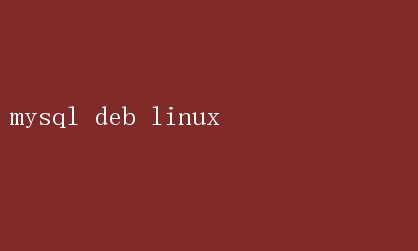在Linux上使用MySQL DEB包安装指南
资源类型:10-0.net 2025-06-25 15:03
mysql deb linux简介:

MySQL on Debian Linux: A Powerful Combination for Robust Database Management In the realm of database management systems(DBMS), MySQL stands out as a versatile, open-source solution trusted by developers and businesses worldwide. Its robust features, scalability, and extensive community support make it an ideal choice for a wide range of applications, from small-scale personal projects to large-scale enterprise systems. When paired with Debian Linux, MySQL unlocks an even more potent combination, offering a stable, secure, and efficient environment for database operations. This article delves into the myriad benefits of running MySQL on Debian Linux, providing insights into installation, configuration, performance tuning, and security best practices. Introduction to MySQL and Debian Linux MySQL, originally developed by Swedish company MySQL AB and later acquired by Oracle Corporation, is a relational database management system based on the Structured Query Language(SQL). It is renowned for its speed, reliability, and ease of use. MySQL is particularly well-suited for web applications, serving as the backend database for numerous popular platforms like WordPress, Drupal, and Magento. Debian Linux, on the other hand, is a free and open-source operating system known for its stability, security, and robust package management system. Its Debian Way philosophy emphasizes free software, collaboration, and a strong community. Debians meticulous approach to software packaging ensures that all components are thoroughly tested and integrated seamlessly, making it a favorite among system administrators and developers alike. Why Choose MySQL on Debian Linux? 1.Stability and Reliability: Debian Linux is famous for its rock-solid stability. The long-term support(LTS) releases provide a dependable foundation upon which to build critical applications. MySQL, being well-integrated into Debians repositories, benefits from this stability, ensuring that database services run smoothly without frequent disruptions. 2.Security: Debians strict security policies and timely updates protect against vulnerabilities. MySQL packages in Debian are rigorously tested and include security patches promptly. Additionally, Debian provides tools like`apt-get` for easy package management and updates, ensuring that both the operating system and MySQL are kept up-to-date with the latest security fixes. 3.Performance: Debian Linux is optimized for performance, making it an excellent platform for running resource-intensive applications like MySQL. The Linux kernels advanced memory management, process scheduling, and I/O handling capabilities contribute to MySQLs efficient operation. Furthermore, Debians package management allows for fine-tuning MySQL configurations to match specific performance requirements. 4.Community and Support: Both MySQL and Debian benefit from large, active communities. This means that users can tap into a wealth of resources, including forums, mailing lists, and documentation. Debians comprehensive package repository also includes a plethora of third-party tools and extensions that can enhance MySQLs functionality. 5.Cost-Effectiveness: As both MySQL and Debian Linux are free and open-source, they offer significant cost savings compared to proprietary alternatives. This makes them an attractive option for startups, small business